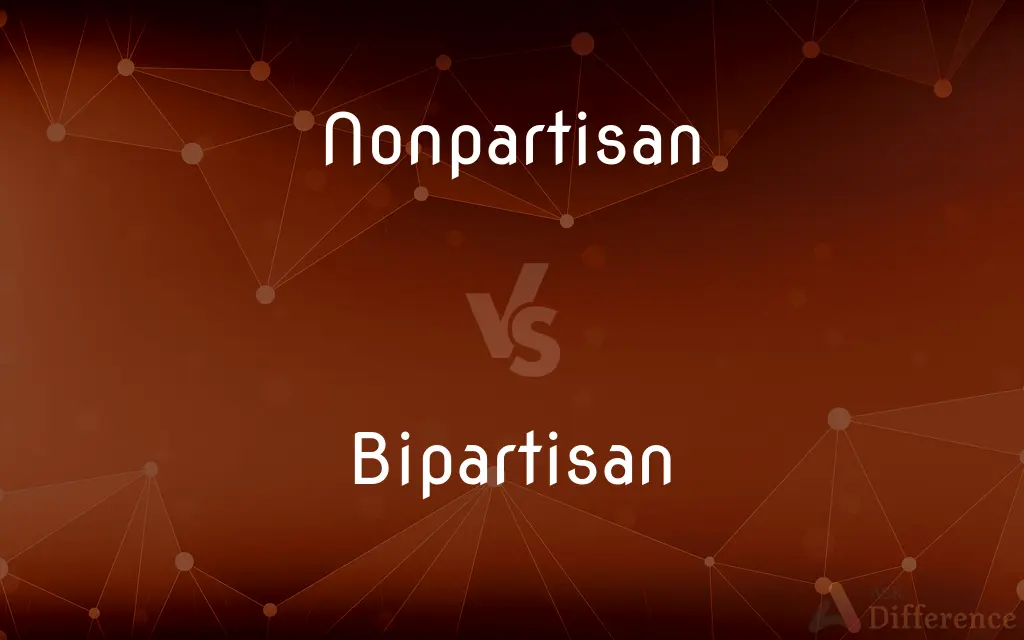Nonpartisan vs. Bipartisan — What's the Difference?
Edited by Tayyaba Rehman — By Fiza Rafique — Updated on November 3, 2023
Nonpartisan means not biased toward any political group; bipartisan involves cooperation between two political parties.

Difference Between Nonpartisan and Bipartisan
Table of Contents
ADVERTISEMENT
Key Differences
Nonpartisan describes an approach or organization that does not support any political party or agenda. The emphasis is on neutrality and impartiality in political matters. Bipartisan refers to an agreement or cooperation involving members or policies of two different political parties. It implies a level of compromise and joint effort towards a common goal across party lines.
Nonpartisan entities often act as mediators or neutral parties in political discussions, aiming to facilitate dialogue without taking sides. Bipartisan efforts, however, require active collaboration between parties, often resulting in policy that has input from both sides of the political spectrum. Both concepts play crucial roles in a balanced political ecosystem.
While a nonpartisan organization may advocate for issues based on principle rather than political ideology, a bipartisan group may push for legislation that reflects a blend of ideologies from two parties. Nonpartisan efforts are about avoiding political coloration entirely, whereas bipartisan activities acknowledge the political hues of both parties involved.
The value of nonpartisan perspectives lies in their ability to cut through political bias to focus on data, facts, or fairness. Conversely, the strength of bipartisan action is in demonstrating that despite differences, common ground can be found and progress made through collaboration. Both approaches seek to advance the public good but do so through different means.
Nonpartisan work is often associated with watchdog groups, think tanks, and judicial roles, which require objectivity. Bipartisan is a term often connected with legislative negotiations, joint political task forces, or instances where political bridge-building is necessary. While nonpartisan initiatives are valued for their neutrality, bipartisan efforts are appreciated for their unifying potential.
ADVERTISEMENT
Comparison Chart
Definition
Independent of political party affiliation.
Involving cooperation of two political parties.
Objective
To remain neutral and unbiased.
To find a middle ground between two parties.
Common Contexts
Judicial proceedings, academic research, civil services.
Legislative efforts, political negotiations, policy making.
Perceived Benefit
Objectivity and impartial decision-making.
Collaboration and consensus between opposing parties.
Usage in Discourse
Indicates detachment from political agendas.
Indicates effort to cross political divides.
Compare with Definitions
Nonpartisan
Unbiased.
The nonpartisan committee will oversee the electoral process.
Bipartisan
Cross-party.
The bipartisan agreement was hailed as a political breakthrough.
Nonpartisan
Not affiliated.
The nonpartisan group promotes voter education.
Bipartisan
Joint effort.
They introduced a bipartisan bill in Congress.
Nonpartisan
Independent.
The nonpartisan report was respected by all sides.
Bipartisan
Cooperative.
The bipartisan initiative addressed infrastructure needs.
Nonpartisan
Neutral.
She delivered a nonpartisan assessment of the policy.
Bipartisan
Across the aisle.
The legislation had bipartisan support.
Nonpartisan
Impartial.
He is known for his nonpartisan stance on economic issues.
Bipartisan
Two-party cooperation.
The bipartisan committee reached a consensus.
Nonpartisan
Based on, influenced by, affiliated with, or supporting the interests or policies of no single political party
A nonpartisan commission.
Nonpartisan opinions.
Bipartisan
Of, consisting of, or supported by members of two parties, especially two major political parties
A bipartisan resolution.
Nonpartisan
Not partisan; impartial and unbiased
Bipartisan
(politics) Relating to, or supported by two groups, especially by two political parties.
A bipartisan bill
Nonpartisan
One who is not a partisan.
Bipartisan
Supported by both sides;
A two-way treaty
Nonpartisan
A person who has not selected or declared a side or party.
Nonpartisan
Free from party affiliation or bias. Opposite of partisan.
Nonpartisan
Not affiliated with any one party; as, a nonpartisan commission to study crime.
Nonpartisan
Free from party affiliation or bias
Common Curiosities
Can an organization be both nonpartisan and bipartisan?
Generally, no, because nonpartisan means no party affiliation, while bipartisan implies two-party involvement.
How does bipartisan work benefit politics?
Bipartisan efforts can lead to broader support for legislation and compromise.
Why is nonpartisan important?
Nonpartisan approaches are important for fair, unbiased decision-making.
What does nonpartisan mean?
Nonpartisan means not aligned with any political party, remaining neutral.
Do nonpartisan organizations influence politics?
Yes, by providing objective analysis and fostering informed debate.
What does bipartisan mean?
Bipartisan refers to actions or policies supported by two political parties.
What's an example of a bipartisan agreement?
Jointly crafted legislation on infrastructure is a common example.
How can a nonpartisan stance be maintained?
By avoiding endorsements or contributions to political parties.
Can a person be nonpartisan?
Yes, if they do not support any political party.
Is nonpartisan the same as independent?
In political contexts, yes; it implies no party allegiance.
Can a bipartisan effort include more than two parties?
While it typically involves two, it can sometimes extend to multiple parties.
Are bipartisan policies always successful?
Not always, but they have the potential to be more stable and enduring.
Why might politicians strive for bipartisan support?
To ensure wider acceptance and longevity of policies.
What's a challenge of bipartisan efforts?
Overcoming ideological differences to reach a compromise.
Can a nonpartisan individual work in a bipartisan organization?
Yes, if they contribute objectively without party bias.
Share Your Discovery

Previous Comparison
Pealing vs. Peeling
Next Comparison
Signed vs. SignatureAuthor Spotlight
Written by
Fiza RafiqueFiza Rafique is a skilled content writer at AskDifference.com, where she meticulously refines and enhances written pieces. Drawing from her vast editorial expertise, Fiza ensures clarity, accuracy, and precision in every article. Passionate about language, she continually seeks to elevate the quality of content for readers worldwide.
Edited by
Tayyaba RehmanTayyaba Rehman is a distinguished writer, currently serving as a primary contributor to askdifference.com. As a researcher in semantics and etymology, Tayyaba's passion for the complexity of languages and their distinctions has found a perfect home on the platform. Tayyaba delves into the intricacies of language, distinguishing between commonly confused words and phrases, thereby providing clarity for readers worldwide.















































